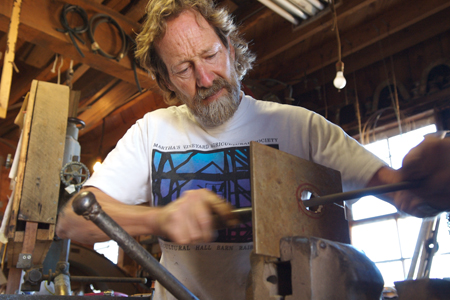There is an inherent pleasure in making. We might call this joie de faire (like joie de vivre) to indicate that there is something important, even urgent, to be said about the sheer enjoyment of making something exist that didn't exist before, of using one's own agency, dexterity, feelings and judgment to mold, form, touch, hold and craft physical materials, apart from anticipating the fact of its eventual beauty, uniqueness or usefulness.
Builders of the World
Posted on Monday, November 28th, 2011 by admin
 Craftspeople make useful things. Be it boats, clothes, furniture, or tools, the thing is made with care and concern for its ultimate use, and it is an expression of the aptitude and sensibility of the maker. People are increasingly attracted to craftwork and consumers are making choices more intimately aware of the quality and origins of the things they purchase, use, and consume. Craftsmanship and its close sibling, Artisanship, are on the rise.
Craftspeople make useful things. Be it boats, clothes, furniture, or tools, the thing is made with care and concern for its ultimate use, and it is an expression of the aptitude and sensibility of the maker. People are increasingly attracted to craftwork and consumers are making choices more intimately aware of the quality and origins of the things they purchase, use, and consume. Craftsmanship and its close sibling, Artisanship, are on the rise.
This is a very encouraging trend, but the sad fact is that our (economic) lives are defined by a profoundly dysfunctional, undemocratic, global economy. This economic system creates an unseemly combination of overabundance and deprivation, production and environmental destruction — unconscionable poverty, un/under-employment, and ill health along side great affluence. As wealth and power are concentrated into ever fewer hands, the middle class declines and poverty increases. Even those with “good” jobs often find their work stultifying and unsatisfying. Our system is inhumane and unsustainable. In a word, broken.
How did we get here? What will it take to change it? What alternatives are desirable? Possible? These are the big, essential questions of our time. They deserve deep thought and discussion, far beyond what I am able to accomplish in this post. Rather, here I will use the example of traditional boatbuilding to suggest where some of the answers might be found.
From the satisfaction of hand working fine woods to the camaraderie of the boat-shop, boatbuilding engenders many pleasures. Every contribution that one makes to a boat — from placing a bung to a installing the transom — is important and tangibly contributes to its final form. And the criteria for what constitutes good work are clear and largely objective; rather than being oppressive, boatwrights use these standards as a guide to creating every higher quality work. The work is important, recognized, and authored; the work is demanding and draws out the boatwright’s best efforts. Because of these qualities, the work provides a high degree of accomplishment and satisfaction, which is sadly a rare quality in the vast majority of jobs available in our economy.
Gannon & Benjamin’s boats are built from sustainably harvested lumber, but, from an ecological perspective, what is perhaps most important is that they are built to last for decades on end. In fact, there is no reason why they shouldn’t last more than a century if properly maintained. By design and construction their boats are durable and repairable. They are a repudiation of this age of slipshod work, disposability, and incomprehensible technology. The fact that the boats are meant to last beyond the lifetime of the owners is not only important for its direct contribution to sustainability, but it leads owners and enthusiasts to rethink our relationship to material culture and teaches us to be better stewards of the environment.
The work of Gannon & Benjamin is both supported by an extended community of supporters, enthusiasts and clients, while it nourishes that same community. That interchange holds within it an exemplary economic paradigm, one based on artisanal practices, mutual support, and a local focus. These qualities all but ensure a minimal negative environmental impact, that the benefits are (relatively) equitably distributed, and that the local community benefits. Unlike that global economy, which provides powerful incentives and opportunities for using and abusing people and the environment, the incentives for an artisanal enterprise such as Gannon & Benjamin point in precisely the opposite direction.
In sum, the work of Gannon & Benjamin is satisfying, sustainable, and beneficial to its community. Of course the way they conduct their work is idiosyncratic and not without its own difficulties and contradictions; and it is not clear how one can build a comprehensive economy upon such enterprises. Rather than undermining the applicability of the Gannon & Benjamin “model”, it points to a deeper truth: desirable economic arrangements must be developed according to local needs and resources, and shaped by the unique sensibilities of the people involved.
I am convinced that local, human scale approaches to economic activity will help us slip the noose of global economy. However, I hasten to add that we must use the knowledge and strength of our communities to influence practices and policy at the global level, for if we abdicate our democratic rights to monstrously scaled corporations and their captive policy elites will fill that vacuum. Think Globally, Act Locally!
A number of organizations are dedicated to creating vibrant, sustainable, human scaled economic systems. The Relocalization Network is focused on “building societies based on the local production of food, energy and goods, and the local development of currency, governance and culture”; while the Alliance for Local Living Economies seeks to ensure “that economic power resides locally, sustaining healthy community life and natural life as well as long-term economic viability.”
As a final note I would like to add a comment from Michael Crawford, author is the powerful and profound book, Shop Class as Soul Craft. In his 2011 commencement address at The Landing School, he noted that “To be the maker of everyday objects is to assume a special place in our common life. You are no mere spectator or consumer. Rather, you are a builder of the world.” Let us all become builders of the world!





